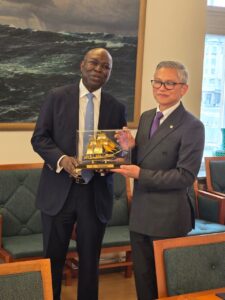Nigeria, Republic of Benin Officially Deploy SIGMAT to Harmonise Customs Operations Along Abidjan Corridor

Nigeria, Republic of Benin Officially Deploy SIGMAT to Harmonise Customs Operations Along Abidjan Corridor
By Jerry Aguigbo
The official
launch of the SIGMAT connectivity between Nigeria and the Republic of Benin, took
place at the historic Seme-Krake Joint Border Post yesterday. This launch marked a major
milestone in the collective pursuit of seamless trade integration and regional economic
transformation across West Africa amongst others. The Official Launch was done by the Nigeria Customs Service, with Customs Comptroller -General, Adewale Adeniyi and the Customs Benin Republic, led by its Director General, Benin Customs Administration, Mrs Adidjatou Hassan Zanouvi, also present was the ECOWAS Commissioner of Tax who oversaw the official Launching.
The Nigeria Customs Boss speaking at the event said
the Interconnected System for the Management of Goods in Transit (SIGMAT) is a
flagship initiative of the Economic Community of West African States (ECOWAS), aimed
at digitalising and harmonising customs transit operations across member states.
Conceived over a decade ago, the SIGMAT platform was designed among others, to
Improve visibility of goods in transit
Combat diversion and fraud along corridors
enhance inter-agency coordination,
simplify border procedures and reduce delays. It is also designed to
facilitate trade while securing state revenue
Implementation began progressively with pilot deployments in countries such as Burkina
Faso, Niger, Côte d’Ivoire, Mali, Ghana, and Togo, with the support of the ECOWAS
Commission and German Development Cooperation (GIZ).
“For Nigeria, SIGMAT reflects our strategic ambition to align with regional digital customs
standards and drive the modernization of trade corridors.
Current Status of SIGMAT Implementation and Deployment
I am pleased to report that Nigeria Customs Service has completed all technical,
operational, and policy prerequisites for SIGMAT deployment. Highlights of our readiness
include:
Development of a dedicated SIGMAT application, built by our in-house technical
team
Integration of SIGMAT with our Unified Customs Management System (B’Odogwu
Establishment of connectivity (secure VPN and ActiveMQ messaging infrastructure)
with Benin
Deployment of the application at the SEME Area Command as the pilot corridor
Technical testing and validation of message exchange protocols between Nigeria
and the Benin Republic
Successful connectivity to the ECOWAS eHub, hosted in Lomé, Togo, which acts as
the regional node for all SIGMAT communications.
CGC Adeniyi went further to highlight the key achievements so far.
“Development of a standalone SIGMAT application tailored for Nigeria’s customs
landscape:
Successful testing of real-time transit message exchange between Nigeria and
Benin,
Mapping and harmonisation of entry/exit itineraries at the Seme-Krake border,
Establishment of direct connectivity to the ECOWAS eHub, ensuring regional
interoperability,
Strengthened collaboration with the Benin Customs Administration through
multiple bilateral technical meetings
These milestones not only reflect Nigeria’s technical capacity but also our unwavering
commitment to regional integration.”
Adeniyi also listed a number of challenges slowing the quick gains of the project . According to him,
“Despite these successes, we must acknowledge certain challenges that have delayed full
deployment of new clearance applications of both Nigeria Customs Service and
the Benin Customs Administration,
delays in technical feedback from our partner administration in Benin at critical
stages of implementation.
Varying levels of automation and ICT maturity across other Nigeria-Benin border
posts, which may limit SIGMAT expansion beyond Seme-Krake in the short term
The need for more robust stakeholder sensitisation and training, especially among
transporters, clearing agents, and border agencies.
Language barrier especially during the virtual and physical technical meetings.
Limited operational awareness among some border communities and transit
corridor stakeholders.
The Way Forward
Looking ahead, the Nigeria Customs Service proposes the following strategies:
Expand SIGMAT deployment to additional border locations (e.g., Idiroko,
Chikanda, and Katsina) with support from ECOWAS and national partners
Strengthen bilateral communication mechanisms to ensure timely technical
engagement between Nigeria and Benin
Collaborate with ECOWAS and GIZ on capacity building programmes for customs
officers, private sector actors, and relevant MDAs
Establish a joint SIGMAT Monitoring Taskforce to track system uptime, message
flow, and procedural compliance,
Continue engagement with the ECOWAS SIGMAT Steering Committee to share
lessons learned and support other member states in their implementation journey
NCS Mandate on SIGMAT.
The Nigeria Customs Service reaffirmed Nigeria’s full support for the broader ECOWAS
digital trade facilitation agenda, including:
The expansion of SIGMAT to multimodal transport corridors (seaports, airports,
and inland container depots)
Alignment of SIGMAT data with emerging platforms such as the ECOWAS Regional
Trade and Transport Observatory (RTTO)
Collaboration on cross-border digital identity and risk profiling for compliant
traders
Harmonisation of national legislation to support the legal framework for transit
under the SIGMAT regime.
Mrs. Adidjatou Hassan Zanouvi said that the SIGMAT platform will go a long way in reducing delay and enhancing trade facilitation between both countries.
“The technical launch for the SIGMAT platform, which is a very important milestone for the cooperation and the interoperability between Benin and Nigerian Customs, because it will facilitate the move of the goods and also will help our customs services to fight against any fraud, to have an exclusivity in collecting revenue and also facilitate trade.
“The system will really solidify and facilitate the move of the goods from Abidjan, which is already in the SIGMAT system from Abidjan, all the way to Benin and then to Nigeria, and also when goods are coming from Nigeria to use the corridor, SIGMAT





